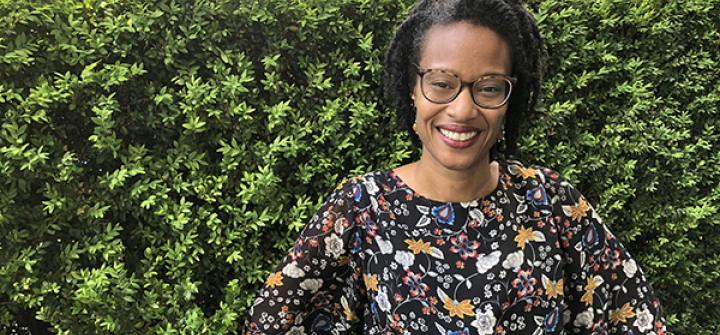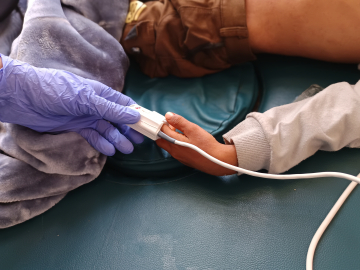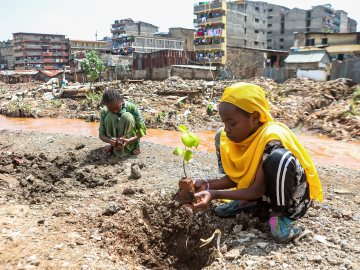A View Inside the Whirlwind: Loyce Pace on #WHA72
Each May, the World Health Assembly brings a whirlwind of global health debate and discussion to the UN’s Palais des Nations in Geneva.
Loyce Pace, president and executive director of the Global Health Council, was there again this year to advocate the organization’s priorities for health. In this Q&A, which occurred on May 22, Pace surveys #WHA72’s main topics, the US role and the value of the annual event.
What’s the vibe this year? How’s it feel?
It feels good. Some people are saying it doesn’t feel as hectic as it has in the past. And I wonder if that’s a reflection of other meetings happening around the same time, whether it’s a recent multilateral stakeholder meeting on universal health coverage and the upcoming high-level meeting, or other big events like Women Deliver. But it feels a bit more manageable this year. It also could be a reflection of what, arguably, is a more focused agenda, or an agenda that’s centralized around UHC.
Any surprises this year kind of in terms of what you’re seeing and events focuses?
Yeah, I don’t know if there are real surprises. I think there are a couple of resolutions that have popped up that are interesting, such as the WASH [water, sanitation and hygiene] in Health Care Facilities Resolution, and there’s some other movement around cervical cancer and ways that WHO wants to lead in that space.
Let’s talk about universal health coverage. Obviously, the big focus this year. Any sort of concrete advances that you’ve seen so far?
Nothing concrete just yet. It’s interesting to see how that’s unfolding so far. And, how that will relate to some of the discussions here, particularly around, again, some contentious issues like sexual and reproductive health and just overall language around leaving no one behind. I think it’s also important to think about where the world leaders come together on this stuff. I think there’s broad agreement that we can’t achieve something as big as UHC and something as ambitious as universal health without that sort of collaboration.
So we’ve talked in the past about the Trump administration and how it’s perceived internationally, how it’s shaped attitudes toward the US government. How do you see things playing out this year?
People always are paying attention to the US, and I think you’ve talked before about how that’s been the case, and that continues to be true. We walk into a room and people are still wondering what we’ll say and how we’ll weigh in, even two, three years in. But what is also interesting is I think there’s some surprise when we might do the unexpected, and this issue around transparency [in drug prices] is a good example of that. And those of us who live and work in the US are not surprised to hear comments from the Secretary [of Health and Human Services Alex Azar] in support of at least price transparency, but I’ve heard from multiple people here who have asked even, “Is that really true that the US is supporting?”
On Tuesday [May 21], Secretary Azar, gave full support for vaccines and confidence in vaccines. How important was that given President Trump’s past tweets about autism and vaccines?
I think it was incredibly important to hear that. And even more so to hear his support for WHO and its leadership. Look, we appreciate the leaders in the administration who echo the importance of evidence base and leaning on that evidence base and data-driven approaches to global health. We know that vaccines have been critically important to our global health goals, and very much appreciate him reiterating that for the entire community to hear.
A lot of what goes on here at WHA in the side events and technical briefings is preaching to the choir. These are all ministers of health and senior health leaders all talking about the importance of health.
Right.
What’s the value in that? What’s the value in the World Health Assembly?
Yeah, I do think there is something to be said for making sure we’re on the same page collectively, and I guess I see that at a few levels. So [for] member states, it’s obvious that there’s an inherent function of WHA in ensuring, or at least facilitating, their consensus at a government level. But then given that there is a space for civil society here … there’s an opportunity for governments and these non-state actors to liaise around their positions and maybe call us around some very important goals as well. So that’s key.
And … there’s really an opportunity for … the positions or decisions from the World Health Assembly to be reflected in other dialogues. So to the extent these ministers of health are joining G20 meetings, and even members of civil society are part of other UN discussions that span the development spectrum, I think that that is maybe the greatest value.
And also a big part of it is the accountability factor in terms of just getting on the record what a country is committing to for example?
Of course. It’s very true. And thanks for making that point. If nothing else, you can flip back to page whatever and paragraph whatever and say, “Hey, remember that time in May when we were going back and forth?” It’s not in an email, it’s not in a phone call, it’s not a handshake and a wink, it’s actually pen put to paper.
Last question. Yesterday [May 21] you hosted a side event for civil society on UHC. What was the goal for that? You broke into sort of work sessions.
The aim was really to ensure that civil society and community stakeholders could be involved real time in the drafting of what will become the political declaration. It’s really important to us that our inclusion is not just seen as a box checking exercise and that we’re not just informed, but consulted, which is an important distinction. So instead of starting with a panel of so-called experts … we could actually go to the community first and say, “Okay, what are you thinking? And what do you think needs to be in it?” ?
One of the things we try to do here at WHA … is we do try to take the bureaucracy out of our engagement here, right? We do try to take the stuffiness out of it and kind of bring the NGO-ness to Geneva and the halls of the Palais.
Ed. Notes: Check out the latest news from #WHA72 here.
Join the tens of thousands of subscribers who rely on Global Health NOW summaries and exclusive articles for the latest public health news. Sign up for our free weekday enewsletter, and please share the link with friends and colleagues.
Loyce Pace, Global Health Council executive director, at #WHA72 in Geneva. (Image: BWS)





